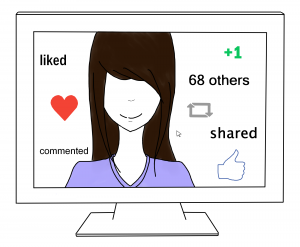Psychological advantages of “selfies”
 As Oxford Dictionary’s word of the 2013 year, “selfies” have been flooding social media websites. Most of the world has been caught in this frenzy- either directly participating in it, or mocking it. Young students, however, seem to be the most affected by this new trend. As damaging as selfies are portrayed to be, they may actually prove to have several advantages, including raising self-esteem.
As Oxford Dictionary’s word of the 2013 year, “selfies” have been flooding social media websites. Most of the world has been caught in this frenzy- either directly participating in it, or mocking it. Young students, however, seem to be the most affected by this new trend. As damaging as selfies are portrayed to be, they may actually prove to have several advantages, including raising self-esteem.
Despite freshman Caroline Kim’s strong self-assurance and confidence, when she posts a photo of herself on Facebook, she also secretly hopes to get multiple encouraging and flattering comments, likes, and shares. And for each one she receives, her confidence goes up one notch higher.
“Every like and positive comment I get does help raise my confidence,” Kim said. “I feel I am socially well integrated and have a lot of friends. When I post a picture, of course I always hope that I will get a lot of likes and comments, and I do get a little insecure. However, I do know the internet isn’t everything and I would rather be out with my friends.”
According to a survey conducted by Common Sense Media of more than 1000 teens aged 13 to 17-years-old, one in five teens felt more confident, popular, and better about themselves when using social media while only 4 percent of teens felt worse about themselves.
While Pen Psychology AP teacher Vararat Chaiyont believes that selfies should not be used as a way to boost self-esteem, she does acknowledge that they have considerable influence over people.
“If someone posts a selfie of him/herself, then depending on the public’s response, it will either encourage him/her to continuing posting selfies or discourage him/her,” Chaiyont said. “It’s the reactions that will shape a person’s behavior. Insecure people probably are not going to take selfies and post them [but if they do and receive positive feedback] it would encourage them to do it more. I might not necessarily make them more self-confident, but it will make them less shy exhibiting themselves.”

